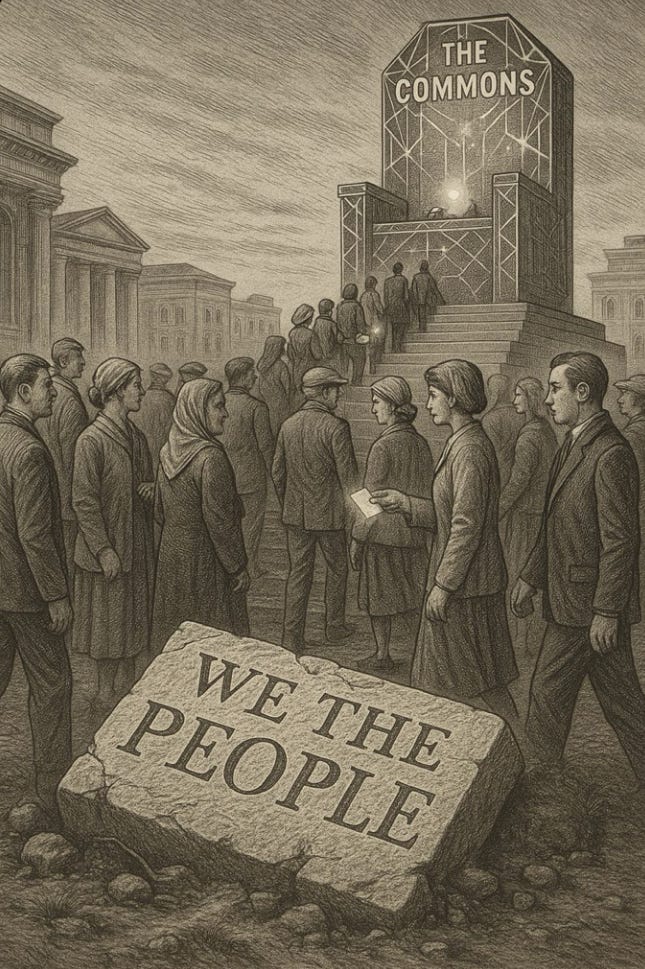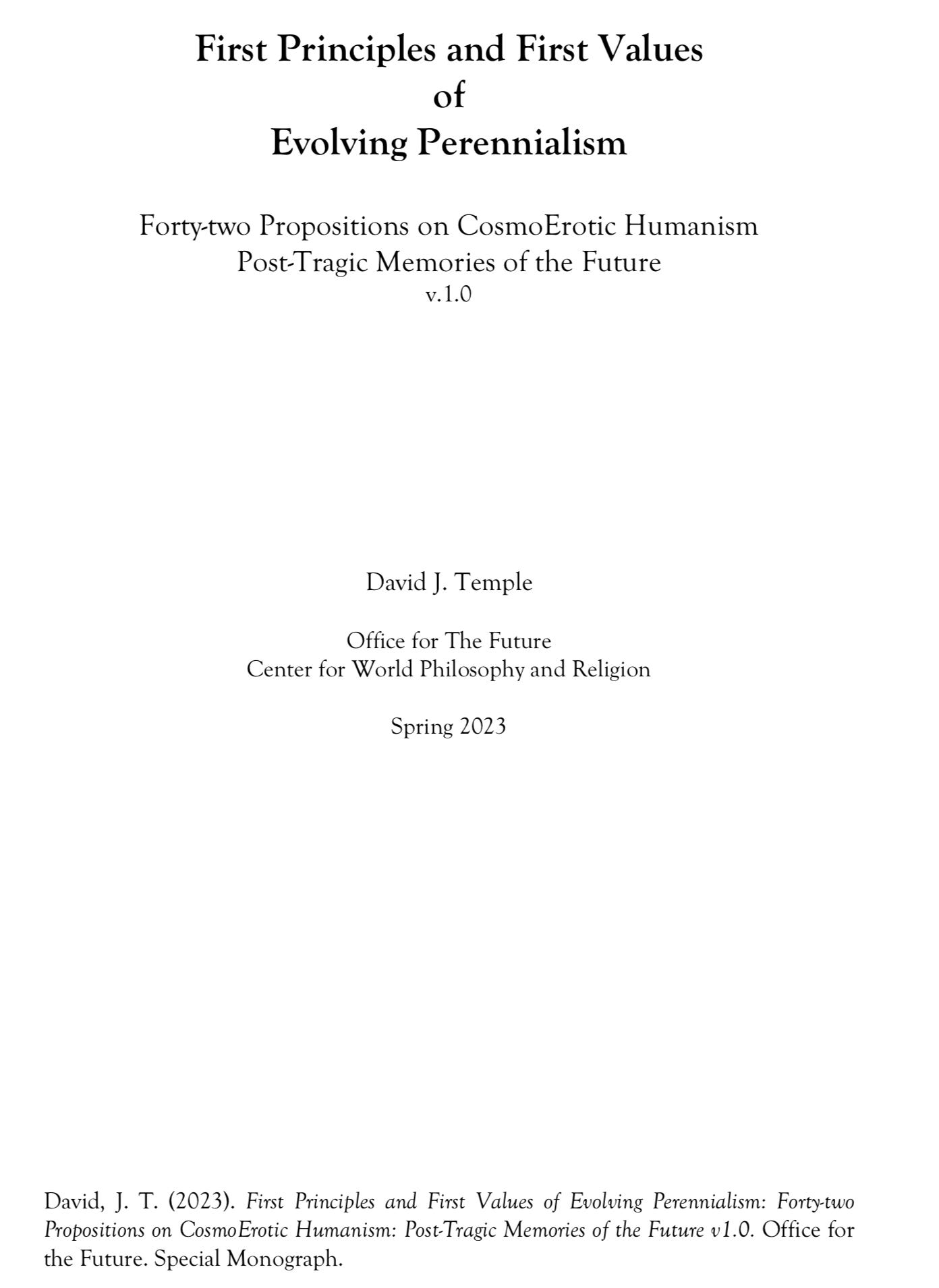The Declaration of Independence and Constitution lie toppled and forgotten, while citizens line up to receive permissions from a digital throne. A people without civic memory cannot see what they have already lost. ‘The People’ enthralled, gladly ‘ascend’ to warmly embrace their new Sovereign System, comprising the Digital Leviathan under Techno Theocracy.
Jordan Hall https://thetrustfoundation.org/about speaks often about the ‘meta-crisis’ of our age; fragile institutions, technological disruption, civilizational drift. His proposed answer is to refound governance around what he (and colleagues/associates) call The Commons; shared resources, digital protocols and communal values managed through new architectures of participation and AI.
At first hearing, this sounds like a humane way beyond the old battles of state versus market. But underneath the language lies a direct replacement of the very foundations on which liberty and self-government rest. This substitution is not primarily technical. It is metaphysical and civic. The danger is not only what The Commons does in design; it is that broad public perception has been conditioned, over generations, to accept the Administrative/Managed State as normative. Few citizens today have the historical memory, civic literacy, or institutional practice to recognise what is being displaced.
The Substitution - From Natural Law to Systems Authority
Three substitutions define Hall’s Commons refounding:
From Natural Law to Systems Architecture.
The Founders presumed rights flowing from the created nature of man, comprising reason, conscience and dignity (imago Dei - not Pico della Mirandola’s self apotheosis from which the UN ‘human rights’ arise). Commons frameworks treat rights as outputs of institutions and protocols, valid only if the community can sustain them [1].
From Popular Sovereignty to Design Participation.
The Constitution treats authority as delegated by the people; Commons models redefine consent as opt-in participation; logging in, tokenizing, or joining a protocol [1].
From Inalienable Rights to Values Alignment.
Rights in principle are non-revocable; Commons governance treats liberties as contingent on alignment with communal values and system stability [1].
These are not cosmetic shifts. They move political authority from persons (prior to systems) to systems (as the source of recognition and permission). ‘Freedom’ becomes a permitted mode of operation within an engineered ecosystem rather than a prior condition the system must respect.
Why Citizens Cannot See the Substitution - Civic Terraforming
If the substitution is so stark, why do many citizens accept it without alarm? The answer is simple but devastating; multiple reinforcing processes over the last century have cognitively terra-formed public expectation. Citizens now experience administration, managerial expertise and platform mediation as normal.
Institutional Normalization of the Administrative State
The growth of the professional administrative apparatus redefined governance. Dwight Waldo’s classic The Administrative State argued that expert bureaucracies were now ‘essential to modern life’ [2]. But legal scholars like Philip Hamburger have shown how administrative law often circumvents the constitutional separation of powers, exercising legislative, executive and judicial functions without the checks the Founders envisioned [3]. Citizens thus experience government as regulation and compliance rather than as a civic trust of delegated sovereignty.
Pedagogical Reconfiguration of Education
Public education shifted from civic formation to pragmatic and instrumental models. Father of Western State Education for World Communism, er sorry, for (our) ‘Democracy’ - John Dewey - explicitly reframed education around social democracy and vocational outcomes rather than classical cultivation of civic virtue [4]. ‘Virtue’ - unfortunately in practise, that word (despite adorning the titles of many ‘Best Sellers’) has become meaningless cosmetics and a rallying cry for much impotent romantic idealist, traditionalist, Perennialist posturing. How about we use the civic term ‘moral agency’ instead? You know, the discernment and discipline necessary for exercising self governance, not the assumed display or memorization of mere character traits or self professed virtues. Let’s leave that to your Creator to judge. Moral agency is however, an endowed faculty with which we were all created and which requires (as all potentials do) specific nurturing, disciplining and education over the years of our development through to the age of reason - as the Founders understood only too well. Without that we (The People) remain confined to ignorance and a stimulus response level of incompetency and dependency - the learned helplessness of ‘Dogs & Horses’.
https://x.com/thepalmerworm/status/1952423991232045240?s=61
Confined to the level of Fools and captive to Knaves:
A Fable Of The Lost Republic (Part 1)
In the Supreme Court case Ludecke v. Watkins, 335 U.S. 160 (1948), the Court addressed the scope of the President’s authority under the Alien Enemy Act of 1798, particularly concerning the detention and deportation of enemy aliens during a state of war. In its opinion, the Court referenced the
Surveys confirm the result; the Annenberg Civics Knowledge Survey finds that less than half of Americans can name the three branches of government [5], while NAEP results document long-term declines in civic literacy [6]. Generations have thus grown up without living memory or practice of constitutional self-government.
A Fable of the Lost Republic (Part 2)
Engineered Transformation of the American People: From Sovereign Citizens to Fools & Knaves
Behavioural Science and Policy Design
Choice Architecture and ‘nudges’ (popularized by Thaler and Sunstein’s Nudge [7]) have moved into public policy. Citizens are increasingly governed through default settings and behavioural interventions rather than deliberation or law. Consent becomes engineered behaviour. This conditions the public to accept algorithmic governance as merely a more efficient nudge.
The Rise of Platform Governance
Identity stacks, social platforms and proposals for Network States have shifted governance into digital space [8]. Protocols already set speech norms, distribute resources and adjudicate disputes. When life is mediated by platforms, Commons proposals feel like a continuation rather than a revolution.
Elite Narratives of Technocratic Romanticism
Elites valourize ‘expert solutions’, ‘resilience’, and systems thinking [9]. Crisis rhetoric reframes liberty as a liability wherein ‘system survival’ becomes the highest good. In this rhetorical environment, appeals to resilience™️ easily eclipse appeals to constitutional liberty unless the latter are deliberately taught and reinforced (and the Founders of course stipulated this specific teaching and reinforcement to be the very telos of Education for the Constitutional Republic and the duty of each successive generation to uphold and defend - the very meaning of a ‘Moral People’ - the exercising of their moral agency in constitutional republican self governance).
How the Terraforming Works in Practice
Three mechanisms explain why the public no longer recognizes the republic they have lost:
Diminished Civic Formation
Schools no longer inculcate practices of constitutional self-government (jury duty, civic debate, constitutional interpretation) and consequently the Civic muscle atrophies [5][6].
Administrative Ubiquity
Daily encounters with government are bureaucratic (licensing, compliance, benefits) rather than Civic. The people come to see governance as management, not as popular sovereignty [2][3].
Technological Mediation
Platforms and private protocols regulate social life more visibly than legislatures or courts. Citizens lose experiential connection to constitutional adjudication [8].
A public that has never practiced popular sovereignty cannot defend it.
Why This Matters
A Commons ‘refounding’ does not only replace the Constitution. It also redefines man’s moral agency.
Legal Displacement
Courts give way to algorithmic arbitration. Rights become permissions granted by system protocols.
Moral Subversion
Conscience is reclassified as ‘alignment’ or ‘misalignment’ (under metrics of Social Emotional Learning) with System Values™️. Dissent becomes pathology and behaviour to be modified, medicalized, managed and optimized for required platform access and System Stability. A public habituated to administration and nudges will not see these as usurpations. They will feel them experientially as continuity.
The Path to Recovery for a Population in Acute Cognitive Dissonance
Revive & Resource Civic Education
Reintroduce serious constitutional instruction, civic practice and the metaphysical foundations of liberty (reason, conscience, Natural Law) [5][6]. This is urgent for all public servants, public officials, everyone who has sworn an oath of office to uphold and defend the Constitution. This needs to be the foundational core of all Teacher Training and civic service professional training. Reassert popular sovereignty legally and reinforce constitutional checks on administrative overreach [3]. Safeguard against platform capture. Require transparency, appeal and constitutional limits on identity-stack exclusion [8]. Equip professors, lecturers, tutors and teachers to teach the metaphysics of American Constitutional Republican Liberty - the ontology of man implicit within that and which requires upholding and defending, not sacrificing to constructivist theories predicated on idea laundering in the academy. Founders James Wilson, John Witherspoon etc and Scottish Common Sense Realist Thomas Reid remain essential sources for grounding conscience and rights as real, not system-outputs [10][11].
Jordan Hall’s (and the Trust Foundation more broadly, plus aligned networks e.g. IDW, ARC, Game B, Post Liberal Gov Corps/Sov Corps and many other ‘Post Constitutional’ initiatives) ‘Commons’ is persuasive because it is pitched to a people already conditioned to administration, nudges and platforms. The only antidote is civic re-formation and renewal; recovering the realist ground of the republic, teaching Aristotle/Aquinas Constitutional Republican Natural Law ontological givens - restoring the civic duty of self-government, not the digital ‘opt in’ even now starting to call itself ‘self governance’ - do you see how the language tricks work? It’s always been the same; repurpose existing terms by using them to describe their opposite, especially when severed from their original metaphysics. Without a well resourced, co-ordinated national renewal and reformation with dedicated infrastructure and personnel who understand the stakes, the Commons will not only compete with the Constitution. It will replace it. And to this end we are currently seeing the playing out of propaganda and conflicts on all ‘sides’ to precipitate the required crises and amplify the ‘meta-crisis’. You do see how this works don’t you? Or perhaps like millions of others you don’t want to and prefer simply tuning in to watch the spectacle, while clicking, liking and sharing - eagerly awaiting the rise of the digital commons - your alluring Sovereign Cage of Consent.
‘We The People’ risk abandoning their solid foundation in Constitutional Republican Natural Law Popular Sovereignty for the fragile illusion of a floating, artificial Commons; a trade that will cost them both their sovereignty and their inalienable rights.
[1] Jordan Hall, EP 284 – Jordan Hall on AI, the Commons, and the Church (Jim Rutt Show transcript).
[2] Dwight Waldo, The Administrative State: A Study of the Political Theory of American Public Administration (New York: Ronald Press, 1948).
[3] Philip Hamburger, Is Administrative Law Unlawful? (Chicago: University of Chicago Press, 2014).
[4] John Dewey, Democracy and Education (New York: Macmillan, 1916).
[5] Annenberg Public Policy Center, Annenberg Civics Knowledge Survey (2023).
[6] National Assessment of Educational Progress (NAEP), Civics Report Card (2022).
[7] Richard H. Thaler and Cass R. Sunstein, Nudge: Improving Decisions about Health, Wealth, and Happiness (New Haven: Yale University Press, 2008).
[8] Balaji Srinivasan, The Network State: How to Start a New Country (self-published, 2022).
[9] Frank Fischer, Technocracy and the Politics of Expertise (London: Sage, 1990).
[10] James Wilson, Collected Works of James Wilson, eds. Kermit L. Hall & Mark D. Hall (Indianapolis: Liberty Fund, 2007).
[11] Thomas Reid, Essays on the Intellectual Powers of Man (1785).







The US government has lost all moral authority and whatever we have right now is doing an awful job on the ground, while perception continues to be undermined in the media.
This means that we are governed by force and indoctrination only at this point. Very dangerous times.